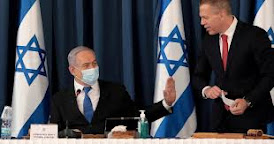When Donald Trump won the election in 2016,
Benjamin Netanyahu became his favorite and best student. The Israeli prime
minister had known Trump for years – he was at the president’s wedding to
Melania in 2005 in Palm Beach – and paid close attention. When he started to
see how Trump’s tactics were working in the US, he adopted some for himself.
Following his mentor’s lead, Netanyahu perfected the art of
right-wing populism. He copied the president’s use of social media, launched a
weekly Trump-like webcast to counter alleged fake news, and attacked the
police, the attorney-general, the courts, the media and the elites. Everything
became fair game, nothing off limits.
Like Trump on race, Netanyahu played up Israel’s ethnicity
card, trying to drive a wedge between Ashkenazim and Mizrahim. He surrounded
himself with people who never hesitated to wander beyond his circle, and who
did Netanyahu’s bidding in the media, the Knesset or the cabinet.
Netanyahu was often the first and most vocal defender of
the Supreme Court. In 2012, for example, he spoke about how a “strong and
independent justice system is what allows for the existence of all the other
institutions in a democracy.” He also refrained from unilateral moves vis a vis
the Palestinians. Annexation? That was never an option. Instead, he was always
the one urging caution.
But all that changed in 2016, and Trump is partially to
thank for it. Netanyahu saw the movement Trump created, and tried to fashion
the same thing in Israel. There was one point in 2017 when he even started
dying his hair different colors.
Yes, we have a different electoral system (which is far
worse for determining the prime minister than what is happening in America),
but when it comes to rhetoric and tactics, we have in recent years pretty much
duplicated what happened across the Atlantic. That is why it will be
interesting to see how Joe Biden election as President wills Israel’s domestic
political system.
The first person who will be directly impacted by a Biden
presidency is Netanyahu, who is reportedly debating whether to cave to Blue and
White’s demands and pass a 2021 budget, or refuse, and take Israel to a new
election.
While Biden does not play a direct role in that
consideration - another election is more about internal polling and Netanyahu’s
bribery trial - a Democratic administration is something to think about.
What then could Netanyahu argue under a Biden presidency?
For one thing, he could do to Biden what he did to Barack Obama: portray him as
an adversary.
While Biden is a known political commodity and has a strong
record among Democrats when it comes to Israel, there will almost definitely be
disagreements over issues like the Iran deal, the settlements and the
Palestinians, and any one of those could be used to ignite a crisis with a
clear political benefit.
That is what he did with Obama, and then used it as part of
his election campaign in 2019 that showed Netanyahu flaunting the infamous
“lecture” he gave Obama in the Oval Office during a visit there in 2012. The
message was simple: only a strong leader like Netanyahu can stand up to a
president like Obama.
Could he do that as well with Biden? It’s possible.
Right-wing pundits and Netanyahu supporters are already mourning what appears
to be the end of the Trump administration. Tzachi Hanegbi, a Likud minister
close to Netanyahu, went as far on Thursday as to warn of a possible Israeli
war with Iran if Biden becomes president.
Is such a war possible? Who knows? But warning about it now
serves one purpose: presenting Biden as a potential danger. And that, in a
corrupt way, could be beneficial for Netanyahu’s political survival.
On the other side of all of this is Blue and White leader
Benny Gantz, who has issued a public ultimatum that he will not allow this
government to continue without a 2021 budget.
Interestingly, a Biden win has the potential to help Gantz.
The reason is because Biden, obviously, is the polar opposite of Trump. He is
not a populist but a veteran politician whose message is one of unity,
compassion and reconciliation, ideas that Gantz has tried to push since
entering politics two years ago.
One of the problems was that until now, a significant number
of Israelis found it hard to imagine an Israel without Netanyahu – an
18-year-old army recruit has never been conscious of any other prime minster –
and all his shtick. It was as if the division that Netanyahu brought with him
to the job was a necessary requirement.
Soon enough, Israelis might see a different kind of
president in the White House, one who doesn’t attack the police, the courts,
the attorney-general and the media. One who speaks about unity, positive change
and coming together.
That might radiate back here and give Gantz a boost in a
future election. While Gantz’s Blue and White currently polls at only nine
seats, he is confident that the party will pull in double that figure in the
next election, one that could happen as early as March.
The reason he might be right is because the defense minister
rarely attacks Netanyahu right now as part of the coalition, and when he does
it is usually with soft shots. A collapse of the government – especially one
initiated by his party – would give the former IDF chief of staff the offensive
once again.
It would also give him a chance to explain why he joined
Netanyahu’s government in April, and why it took him until now to bring it to
an end.
If articulated well, he has some good points to make. While
it is true that Gantz had promised over three campaigns not to sit with
Netanyahu, that was before COVID-19 entered our lives. Once it did and brought
with it the economic crisis that has upended nations, Gantz’s calculus changed
as well.
What he didn’t fully realize in April was that Netanyahu did
not change with him. Gantz’s mistake was thinking that Netanyahu would rise to
the occasion. Sadly, he did not, and instead Netanyahu continued to put
politics before the pandemic, and to work consistently to undermine his
coalition partner.
Privately, Gantz tells party members that he knows there is
almost no chance Netanyahu will abide by the rotation agreement that is supposed
to see the defense minister become prime minister next November. But he does
feel that it is important to provide a chance for a 2021 state budget to pass,
since ultimately that is what the Israeli people need: financial stability and
a government that works for them.
Expect a decision on this in the coming two weeks, but also
expect a Biden win to give Gantz a feeling that a politician like him can
succeed. Israelis will see that someone who comes across as decent, moral and
honest can be president of the largest superpower in the world. Hopefully,
Gantz will think, they can believe the same about their own country.
In a year like 2020 though, it has been learnt that anything
is possible. But one thing is for sure that Trump and his style of politics is
not going away so quickly. If there were people who thought that Trump’s
election in 2016 was a “mistake” or a “malfunction,” that was proven wrong on
Tuesday when he collected close to five million more votes than in 2016.
America is split. It is split geographically and it is split
even within those battleground states – Michigan, Wisconsin and more. Traditionally,
a president does not speak out publicly about policy, politics or party when he
steps down. That was the case with Bill Clinton, with George W. Bush, and until
recently, also with Obama. This could be tricky for Israel, which will need to
navigate between making inroads with a Biden administration and the Democratic
Party, but also at not upsetting an influential former president.


















